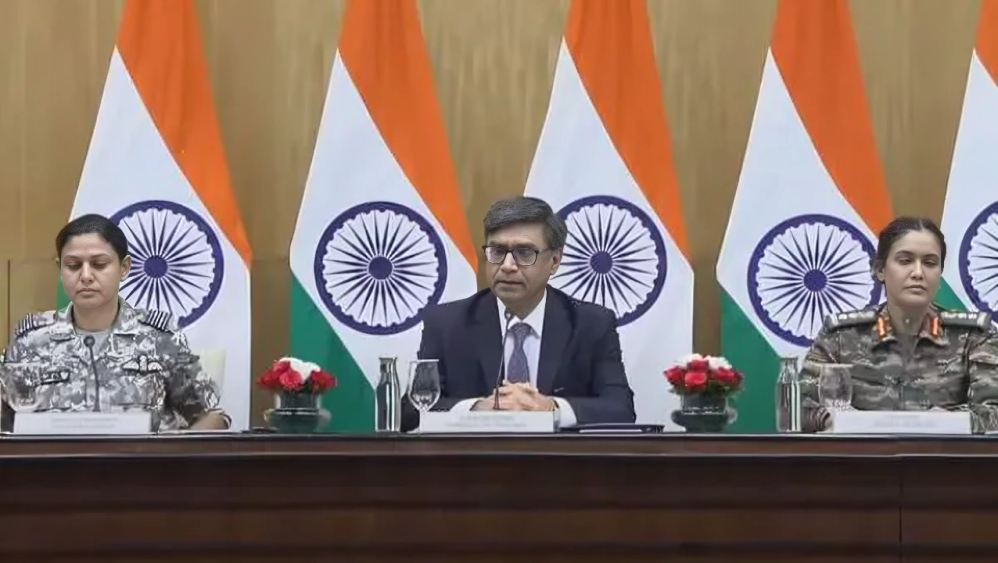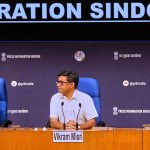In a firm diplomatic response, India has rejected Pakistan’s allegations that it launched missile strikes on Afghan territory, calling the claims “entirely false, inflammatory, and intended to mislead.” The rebuttal, issued by Foreign Secretary Vikram Misri during a press conference on Saturday, comes amid rising regional tensions following India’s anti-terror operation, Operation Sindoor, conducted on May 7.
Also Read: Afghanistan Deny Pakistan’s Claims of Indian Missile Attack on Afghan Soil
“No Indian missiles have targeted Afghanistan. These claims are completely baseless,” Misri stated, underscoring India’s long-standing ties with the Afghan people. In a pointed remark aimed at Islamabad, he added, “The Afghan people don’t need to be reminded which country has historically targeted civilians in Afghanistan,” alluding to Pakistan’s record of supporting insurgent groups in the region.
India’s Ministry of External Affairs (MEA) further clarified that Operation Sindoor was a “measured and non-escalatory” counter-terror mission targeting nine known terror launchpads—four inside Pakistan and five in Pakistan-occupied Jammu and Kashmir (PoJK). The strikes were in retaliation for the April 22 terror attack in Pahalgam that left 26 civilians dead, including 25 Hindu pilgrims.
Pakistan’s accusations that Indian drones struck Afghan territory were swiftly dismissed by Indian officials and fact-checkers. The Press Information Bureau (PIB) has flagged several viral videos and images circulated by Pakistani social media accounts as manipulated or fake, calling it part of a wider disinformation campaign.
Misri also used the occasion to highlight Pakistan’s destabilizing role in Afghanistan over the past decades. He referenced Pakistan’s well-documented support for the Taliban and other extremist factions during the 1990s and early 2000s—a point substantiated by multiple international watchdogs and U.N. reports.
While the Afghan government has not issued an official response to Pakistan’s allegations, New Delhi reaffirmed its commitment to Afghan reconstruction and peace. India has long been one of Afghanistan’s largest regional development partners, investing in infrastructure, education, and healthcare.
Strategic experts see Pakistan’s latest accusation as a deliberate attempt to internationalize the conflict and discredit India’s precise military operations. “This is classic narrative deflection—an effort to shift focus from Pakistan’s state-sponsored terror to fictitious external threats,” said a senior analyst at the Institute for Defence Studies and Analyses (IDSA).
Meanwhile, heightened military readiness continues along the Line of Control (LoC), and diplomatic channels remain active as global powers urge restraint. With misinformation emerging as a potent weapon in this standoff, India’s clear and assertive communication strategy is expected to play a key role in shaping global perceptions.
As tensions persist, India has called upon the international community to hold Pakistan accountable for fostering terrorism, rather than allowing it to obfuscate its role through baseless allegations.In a firm diplomatic response, India has rejected Pakistan’s allegations that it launched missile strikes on Afghan territory, calling the claims “entirely false, inflammatory, and intended to mislead.” The rebuttal, issued by Foreign Secretary Vikram Misri during a press conference on Saturday, comes amid rising regional tensions following India’s anti-terror operation, Operation Sindoor, conducted on May 7.
“No Indian missiles have targeted Afghanistan. These claims are completely baseless,” Misri stated, underscoring India’s long-standing ties with the Afghan people. In a pointed remark aimed at Islamabad, he added, “The Afghan people don’t need to be reminded which country has historically targeted civilians in Afghanistan,” alluding to Pakistan’s record of supporting insurgent groups in the region.
India’s Ministry of External Affairs (MEA) further clarified that Operation Sindoor was a “measured and non-escalatory” counter-terror mission targeting nine known terror launchpads—four inside Pakistan and five in Pakistan-occupied Jammu and Kashmir (PoJK). The strikes were in retaliation for the April 22 terror attack in Pahalgam that left 26 civilians dead, including 25 Hindu pilgrims.
Pakistan’s accusations that Indian drones struck Afghan territory were swiftly dismissed by Indian officials and fact-checkers. The Press Information Bureau (PIB) has flagged several viral videos and images circulated by Pakistani social media accounts as manipulated or fake, calling it part of a wider disinformation campaign.
Misri also used the occasion to highlight Pakistan’s destabilizing role in Afghanistan over the past decades. He referenced Pakistan’s well-documented support for the Taliban and other extremist factions during the 1990s and early 2000s—a point substantiated by multiple international watchdogs and U.N. reports.
While the Afghan government has not issued an official response to Pakistan’s allegations, New Delhi reaffirmed its commitment to Afghan reconstruction and peace. India has long been one of Afghanistan’s largest regional development partners, investing in infrastructure, education, and healthcare.
Strategic experts see Pakistan’s latest accusation as a deliberate attempt to internationalize the conflict and discredit India’s precise military operations. “This is classic narrative deflection—an effort to shift focus from Pakistan’s state-sponsored terror to fictitious external threats,” said a senior analyst at the Institute for Defence Studies and Analyses (IDSA).
Meanwhile, heightened military readiness continues along the Line of Control (LoC), and diplomatic channels remain active as global powers urge restraint. With misinformation emerging as a potent weapon in this standoff, India’s clear and assertive communication strategy is expected to play a key role in shaping global perceptions.
As tensions persist, India has called upon the international community to hold Pakistan accountable for fostering terrorism, rather than allowing it to obfuscate its role through baseless allegations.













